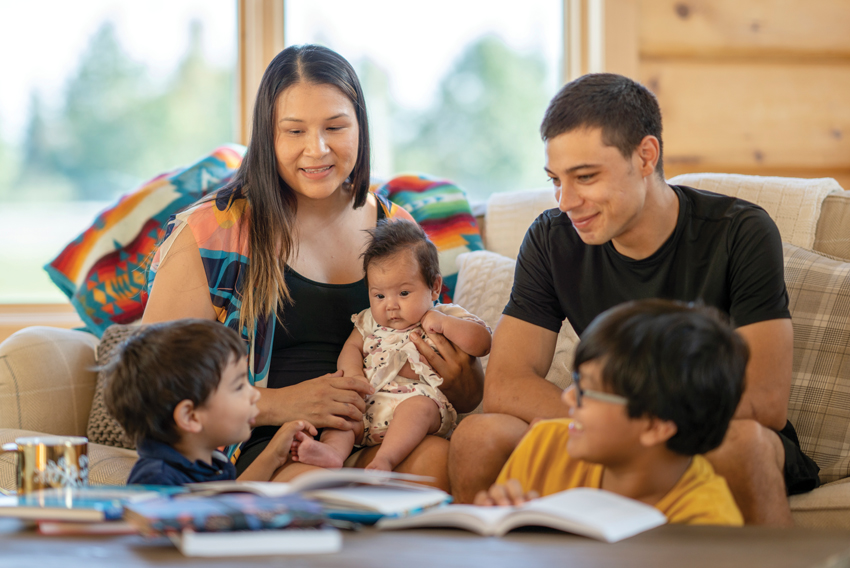Reprinted from the Housing as a Human Right issue of Visions Journal, 2022, 17 (2), pp. 11-12

The Aboriginal Housing Management Association (AHMA) is an umbrella organization of 42 Indigenous housing providers. AHMA’s members oversee more than 5,400 units providing homes to an estimated 8,700 Indigenous individuals and families throughout BC.
In addition to providing Indigenous families, individuals, seniors and youth with affordable housing, AHMA’s member organizations offer various support services, including homelessness outreach and prevention, transition homes, parenting skills, mental health programs, substance use support, social and cultural inclusion programming, basic needs access and many innovative projects and approaches. AHMA members create spaces, services and policies for Indigenous people to find, make and maintain culturally safe homes.
Cultural safety is a mainstream term primarily discussed in the health sector and less so in the housing space. It is used to explain the relationship and responsibility of all participants in the act of service delivery. Cultural safety prioritizes power imbalances within society and asks the person in a position of power to recognize, reflect on and transfer the power back to the colonized person, creating a culturally safe space.
AHMA is developing a definition, framework and assessment tool to ensure that culturally safe housing is available and provided for Indigenous community members wherever they choose to make their home. AHMA intends to train service providers to promote culturally safe approaches among both AHMA members and non-Indigenous providers of services to Indigenous people.
Cultural safety has nothing to do with understanding the unique culture of the “other.” It is not about making sure a lobby has Indigenous art. It delves deeper into physical, emotional, mental and spiritual understandings. So, not only having Indigenous art, but also having coffee, tables and inviting spaces for informal interactions that focus on relationships and connection. Cultural safety is making sure your organization is trauma-informed. Cultural safety is thinking about how the administrative and data aspects of services are delivered to the person—How are we doing these interviews? Am I paying attention to the power imbalance? Cultural safety is questioning and rethinking “common sense,” then changing interactions and expectations of how people will behave in service delivery.
Cultural safety is not an Indigenous word or concept. In the context of housing, different ways of knowing are how a person understands and interacts with their space, how they understand and interact with their community and what drives their values, beliefs and attitudes. Ways of knowing means that the teachings show Indigenous persons who we are, where we come from and what we need to do. The ways of knowing show us how our Elders connect us to spirit, how we see the world and how we interact with it, grounded in our teachings, supported by our Elders.
The term quality housing is used to describe a housing provider’s goal or aim. Let’s deal with the word quality. Quality means a house should not just have a roof overhead. It should also have enough space; demonstrate care; be safe, warm, comfortable; and be in good working order—a place where someone can see a home for themselves. Quality is not just bricks and mortar, but also how the space interacts with the Indigenous occupant and the thought put into the design and development.
Which brings us back to the importance of culturally safe, quality housing for Indigenous communities. In teachings received from the Wet'suwet'en Elder Russell Tiljoe, the houses of the Wet'suwet'en people were built with care by the community to reflect who we were, where we came from and who we belonged to. When you look at the houses Wet'suwet'en people traditionally built, you knew which clan and which house that home belonged to. This understanding of housing is another way to say culturally safe, quality housing.
Indigenous people in BC and Canada have inherent rights to culturally safe, affordable, quality housing. Every person deserves a place to call home, their own space to share with whomever they choose. That space could be in a city, town or rural community. That is why AHMA has unique agendas to work with people in urban, northern and rural settings.
A culturally safe house is a house you live in and care for—taking your responsibility in tending to the home. Culturally safe housing creates a connection to home; a place where you belong; a place that shows who you are, where you come from and where you connect; and a place you feel ownership over. Not ownership in the sense of property, but in the sense of belonging and care. Ownership is a commitment to the land and home, however temporary. Ultimately, if all of this is true, culturally safe Indigenous housing is essential and everyone should stretch to make it a priority.
About the author
Celeste leads a team with the Aboriginal Housing Management Association (AHMA) in housing operations, policy and revitalization. She is dedicated to helping ensure that housing operations run as smoothly as possible for AHMA membership, while also heavily advocating for public policies that ensure safe, quality, affordable housing for Indigenous peoples
